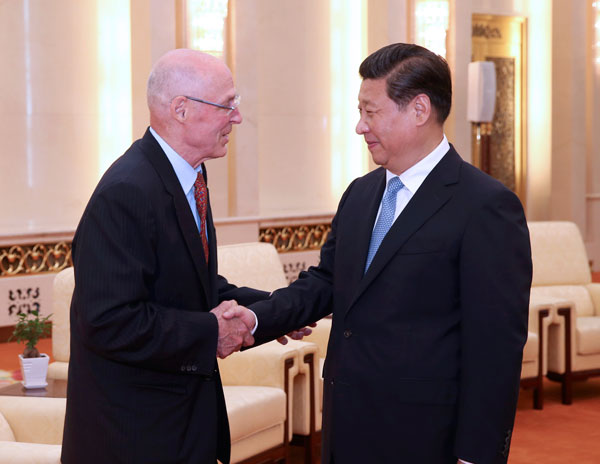President meets American business leaders ahead of strategic dialogue
 |
|
Chinese President Xi Jinping (R) meets with former US treasury secretary Henry Paulson in Beijing, capital of China, July 2, 2014. [Photo/Xinhua] |
The United States should objectively view China's national conditions and policies, President Xi Jinping told a former senior US official on Wednesday, ahead of a key bilateral dialogue.
Analysts said Xi's meeting with a group of US business leaders led by former US treasury secretary Henry Paulson, who is in Beijing to push forward a bilateral investment treaty, reveals Beijing's sincerity to narrow the gap in thought and strive for substantial progress in the China-US Strategic and Economic Dialogue.
"The two sides should expand joint interests, deepen cooperation, plant more flowers, not thorns, clear the interference and avoid suspicion and confrontation," Xi told the US guests at the Great Hall of the People.
He also said China will stick to the path of peaceful development and shoulder its international duties.
"We hope the US will objectively view China's basic national conditions as well as its domestic and foreign policies," Xi said.
Xi also encouraged both sides to "make full use" of bilateral mechanisms such as the Strategic and Economic Dialogue to keep "injecting positive energy" into the key ties and bring tangible achievements.
The always-complex relationship between Beijing and Washington has recently been disturbed by remarks from the US on issues such as territorial disputes and alleged cyberattacks.
On Wednesday, the Foreign Ministry criticized the White House's remarks on a protest in Hong Kong that occurred on Monday.
Washington has also vowed to exert pressure on Beijing's currency appreciation and domestic economic reforms during the Strategic and Economic Dialogue scheduled for July 9 and 10.
Dong Manyuan, vice-president of the China Institute of International Studies, said Xi's comments pointed out the major stumbling blocks and troubles that haunt the China-US relationship.
Bilateral trade surpassed $500 billion last year, which signifies a brighter future, Dong said.
"Therefore, the action of cultivating thorns instead of flowers is totally unnecessary," Dong said.
For instance, he said Washington's rebalancing strategy in East Asia is unlikely to succeed unless the US plays a constructive role in the region.
US Treasury Secretary Jacob Lew and Secretary of State John Kerry are preparing to travel to Beijing for the sixth round of the Strategic and Economic Dialogue with their Chinese counterparts.
Paulson, who is on his 80th visit to China, told Xi the US business community is expecting the signing of a bilateral investment treaty at an early date. Discussion on the treaty will be a high priority at the talks.
As treasury secretary from 2006 to 2009, Paulson headed the US delegation in the dialogue.
Lew said on Tuesday that it was unrealistic to expect the sides to conclude the treaty during this round of talks.
Still, Zhou Shijian, a senior trade expert and a professor at Tsinghua University, said he was sure they will finally agree to such an investment.
"Both China and the US have desires for more foreign investment," he said.
The US capability in attracting foreign investment has kept dropping, from $310 billion in 2008 to $159 billion in 2013.
In sharp contrast, China's foreign direct investment in the United States jumped 144 percent in the first five months of this year to $2.03 billion, the Ministry of Commerce said in June. Still, China lags far behind the top 10 FDI sources in the US.
Looking back on previous cases of Chinese investment held up by US Congress — including China's telecommunication giant Huawei's entry into the US market in 2008 — Zhou suggested that "the investment issue should rule out the disturbance by political motives".
"What is more, Washington is demanding Beijing to do more in domestic financial reforms, which is actually trying to create a bigger imbalance, because Chinese financial firms are facing tougher thresholds when they are trying to tap into the US market," Zhou said.
US Ambassador Max Baucus said last week that a bilateral investment treaty could benefit China as much as Beijing's accession to the World Trade Organization did in 2001.
Contact the writer at lixiaokun@chinadaily.com.cn
